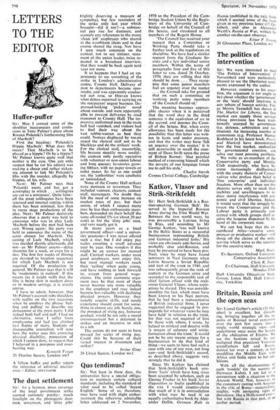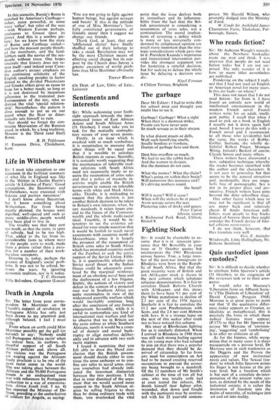Britain, Russia and the open seas
Sir: Lionel Gelber's article (11 Oct- ober) is excellent, but disturb- ing, bringing together all the re- ports of Russian naval expansion over the past few years, into a single world strategic view—and underlining once more the lessons of the abdication of Empire- We see the bastions raised by our maligned (but prescient) Victorian grandfathers fall and Russia. denied tor over a century, at last straddling the Middle East. w Iih Africa and India open to her am- bitions.
With all the shortcomings of such 'models' (in the manner of Hermean Kahn), I am led- a comparison with a situation n the Ancient World. Not, however. to the customary casting with America in the role of Rome—materialistic. mighty, with intriguing signs. Of decadence, like a Hollywood epic
but with Russia in that part, at an earlier period. Spec:tatOr, 14 November 1970 matched by Americas's Carthage— —with Western Europe perhaps, analogous to Greece (past its glory). And this is a sombre pic- ture: for we know how the story of Rome and Carthage ended— ed the merchants, and the land- richer, more powerful, in some and how the peasant people thrash- sincerely that history does not re- the continuing solidarity of the ways 'softer', but ruler of the seas lubbers sunk the navies of the sea- people without trace. One hopes dian author's proper emphasis on English speaking peoples (a factor denied to the divided Phoenicians and Greeks alike) gives us cause to Europeanism of the EEC, who so peat itself—and indeed your Cana- hope for a better result, so long as it is not destroyed by incautious adherence to the truncated pan- distrust the vital 'special relation- ship'. Nevertheless, the pattern is close enough to put us on our guard when the Bear so deter- minedly sets himself to ruin. In this scenario, Russia's Rome is Nor should we forget the con- tinuing Mesrianism of the Russian creed, in which, by a long tradition, Moscow is the Third (and final)









































 Previous page
Previous page